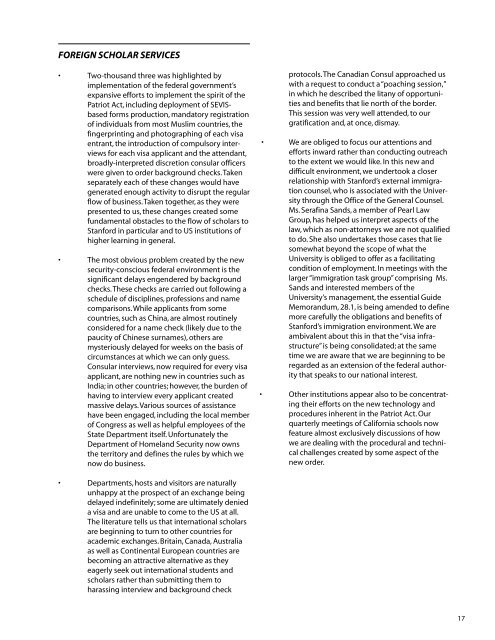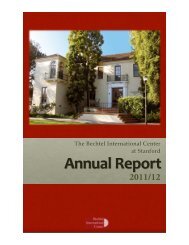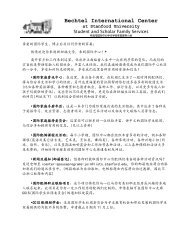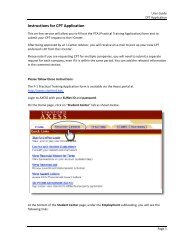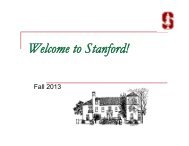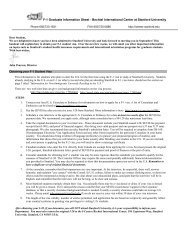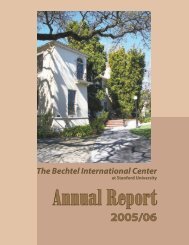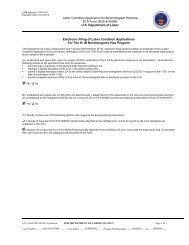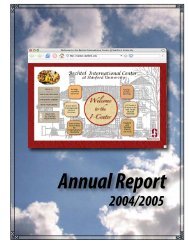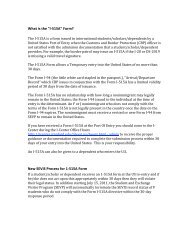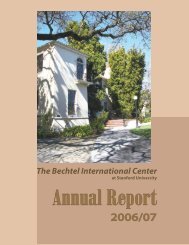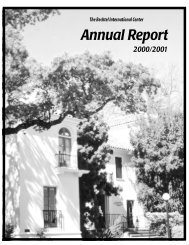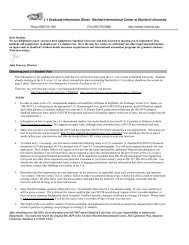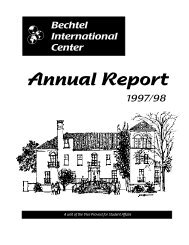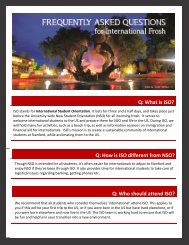Download - Bechtel International Center - Stanford University
Download - Bechtel International Center - Stanford University
Download - Bechtel International Center - Stanford University
You also want an ePaper? Increase the reach of your titles
YUMPU automatically turns print PDFs into web optimized ePapers that Google loves.
FOREIGN SCHOLAR SERVICES<br />
• Two-thousand three was highlighted by<br />
implementation of the federal government’s<br />
expansive efforts to implement the spirit of the<br />
Patriot Act, including deployment of SEVISbased<br />
forms production, mandatory registration<br />
of individuals from most Muslim countries, the<br />
fingerprinting and photographing of each visa<br />
entrant, the introduction of compulsory interviews<br />
for each visa applicant and the attendant,<br />
broadly-interpreted discretion consular officers<br />
were given to order background checks. Taken<br />
separately each of these changes would have<br />
generated enough activity to disrupt the regular<br />
flow of business. Taken together, as they were<br />
presented to us, these changes created some<br />
fundamental obstacles to the flow of scholars to<br />
<strong>Stanford</strong> in particular and to US institutions of<br />
higher learning in general.<br />
• The most obvious problem created by the new<br />
security-conscious federal environment is the<br />
significant delays engendered by background<br />
checks. These checks are carried out following a<br />
schedule of disciplines, professions and name<br />
comparisons. While applicants from some<br />
countries, such as China, are almost routinely<br />
considered for a name check (likely due to the<br />
paucity of Chinese surnames), others are<br />
mysteriously delayed for weeks on the basis of<br />
circumstances at which we can only guess.<br />
Consular interviews, now required for every visa<br />
applicant, are nothing new in countries such as<br />
India; in other countries; however, the burden of<br />
having to interview every applicant created<br />
massive delays. Various sources of assistance<br />
have been engaged, including the local member<br />
of Congress as well as helpful employees of the<br />
State Department itself. Unfortunately the<br />
Department of Homeland Security now owns<br />
the territory and defines the rules by which we<br />
now do business.<br />
• Departments, hosts and visitors are naturally<br />
unhappy at the prospect of an exchange being<br />
delayed indefinitely; some are ultimately denied<br />
a visa and are unable to come to the US at all.<br />
The literature tells us that international scholars<br />
are beginning to turn to other countries for<br />
academic exchanges. Britain, Canada, Australia<br />
as well as Continental European countries are<br />
becoming an attractive alternative as they<br />
eagerly seek out international students and<br />
scholars rather than submitting them to<br />
harassing interview and background check<br />
protocols. The Canadian Consul approached us<br />
with a request to conduct a “poaching session,”<br />
in which he described the litany of opportunities<br />
and benefits that lie north of the border.<br />
This session was very well attended, to our<br />
gratification and, at once, dismay.<br />
• We are obliged to focus our attentions and<br />
efforts inward rather than conducting outreach<br />
to the extent we would like. In this new and<br />
difficult environment, we undertook a closer<br />
relationship with <strong>Stanford</strong>’s external immigration<br />
counsel, who is associated with the <strong>University</strong><br />
through the Office of the General Counsel.<br />
Ms. Serafina Sands, a member of Pearl Law<br />
Group, has helped us interpret aspects of the<br />
law, which as non-attorneys we are not qualified<br />
to do. She also undertakes those cases that lie<br />
somewhat beyond the scope of what the<br />
<strong>University</strong> is obliged to offer as a facilitating<br />
condition of employment. In meetings with the<br />
larger “immigration task group” comprising Ms.<br />
Sands and interested members of the<br />
<strong>University</strong>’s management, the essential Guide<br />
Memorandum, 28.1, is being amended to define<br />
more carefully the obligations and benefits of<br />
<strong>Stanford</strong>’s immigration environment. We are<br />
ambivalent about this in that the “visa infrastructure”<br />
is being consolidated; at the same<br />
time we are aware that we are beginning to be<br />
regarded as an extension of the federal authority<br />
that speaks to our national interest.<br />
• Other institutions appear also to be concentrating<br />
their efforts on the new technology and<br />
procedures inherent in the Patriot Act. Our<br />
quarterly meetings of California schools now<br />
feature almost exclusively discussions of how<br />
we are dealing with the procedural and technical<br />
challenges created by some aspect of the<br />
new order.<br />
17


